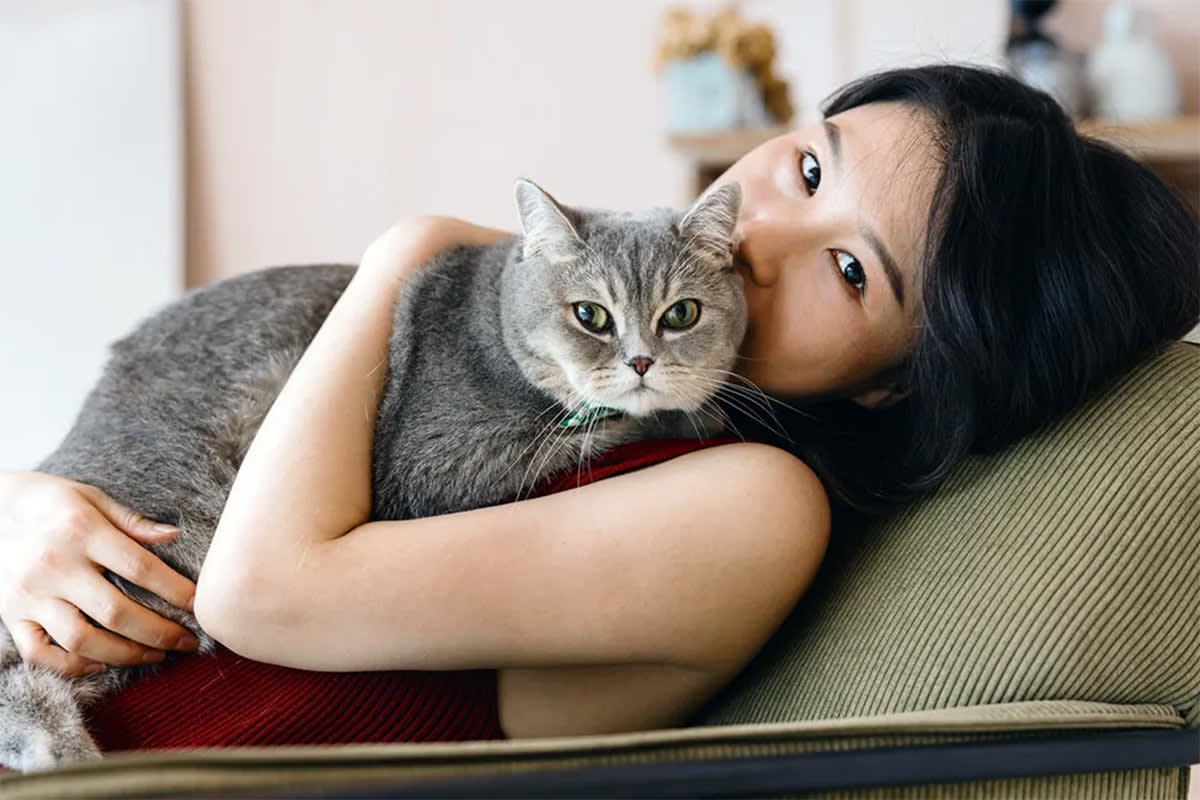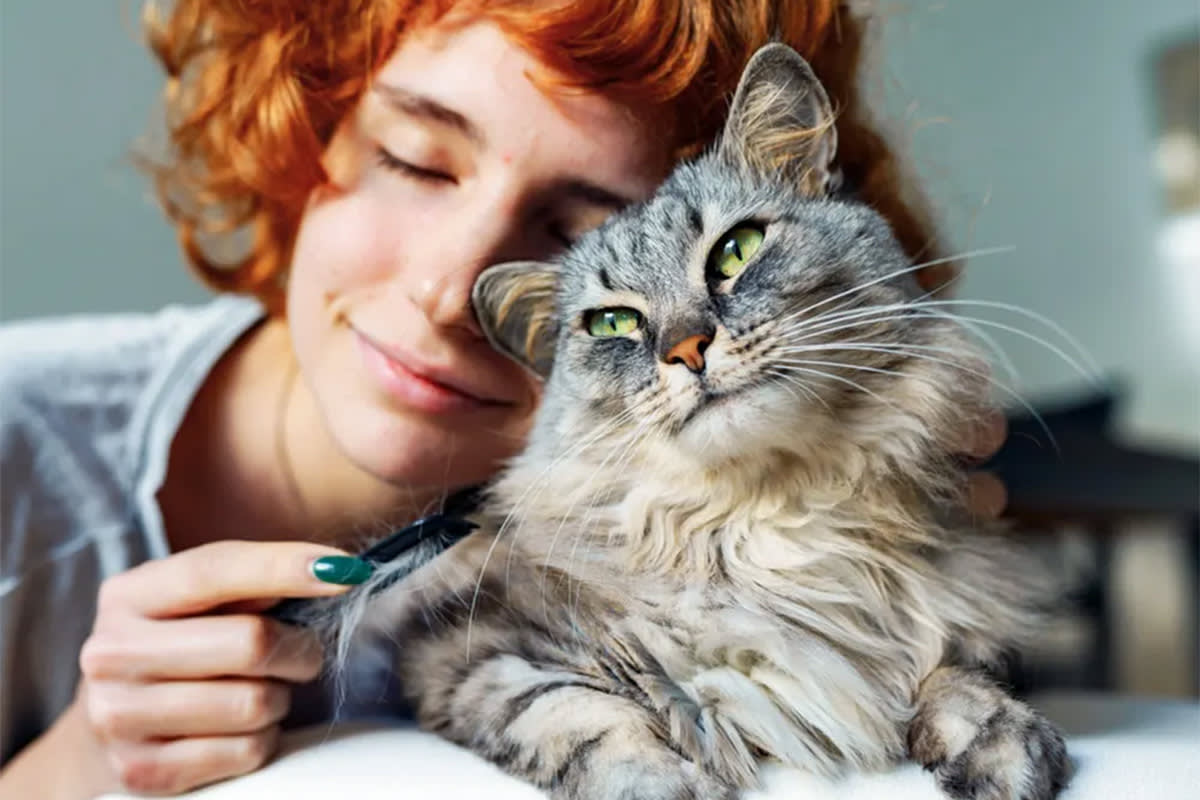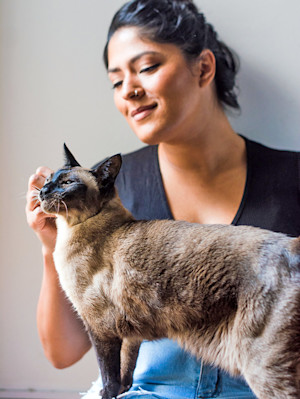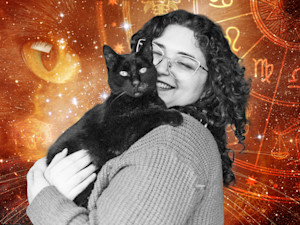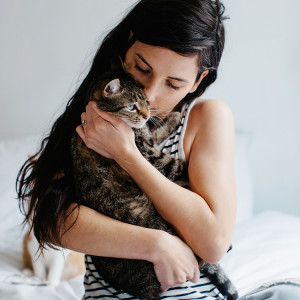The Real Reason Your Cat Purrs (Or Doesn’t)
Spoiler alert: There may be more than one.
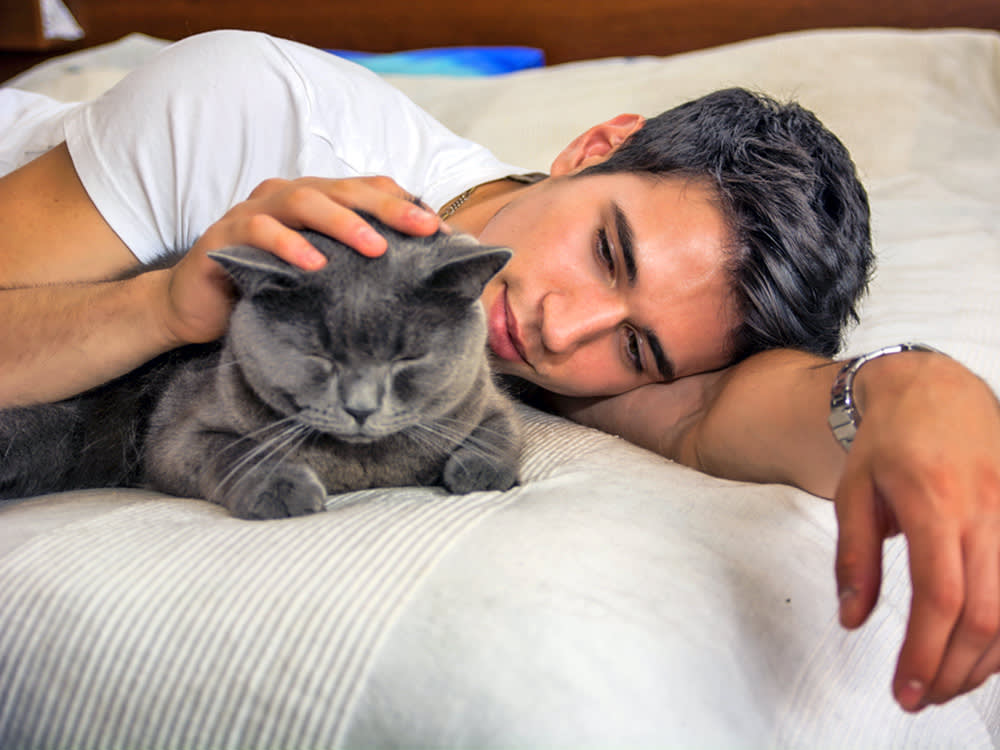
Share Article
A purring cat is like a cup of tea: warm, soothing, and pleasant. When one of my three kitties climbs into my lap and starts running that internal motor, my stress melts away. Not only that, I feel loved and trusted — as if their purring is reassurance that I’m a good cat mom. But is that wishful thinking? Why do cats purr, anyway? And why doesn’t one of mine purr at all? Is he unhappy? Should I be worried?
A recent study from Japanopens in new tab shed some light on the mystery of purring, with the findings suggesting that a cat’s purr may have more to do with genetics than with how happy they are.
When I ask Dr. Nell Ostermeieropens in new tab, a veterinary spokesperson for Figo Cat Insuranceopens in new tab, to break the study down for me, this is what she says: “Researchers identified a genetic link related to purring in cats. Specifically, cats with a short-type androgen receptor gene tended to purr more than cats with the long-type. This suggests that genetics — particularly genes related to testosterone — may be one of several factors that determine how much a cat purrs.”
Purring: It’s complicated.
So, genes may be one reason behind my cats’ soothing purrs — but what are the other factors? Dr. Ostermeier says cats purr for many different reasons, and that not all purrs mean the same thing.

“Cats may purr when they’re content, seeking attention, stressed, ill, or even injured,” she tells me. “The key is to interpret purring in the context of the cat’s body language and personality — just like how people cry or sigh for very different reasons.” (This is a great point and one I deeply relate to: I’ve cried at least three times in the last week, for at least three different reasons.)
“The truth is, purring is still something of a mystery,” Dr. Ostermeier says. As for my cat who doesn’t purr, she says not to worry. “Most of the time, a lack of purring is not a problem. The main exception is if a cat who has purred regularly suddenly stops, in which case a veterinarian should be consulted to rule out any underlying issue.” The same goes, she says, for an increase in purring — “unless it’s a new pattern linked to unwanted behavior or other concerning changes. In those cases, a vet visitopens in new tab is recommended.”
Purring isn’t always a positive sign.
Joey Lusvardi, a certified cat behavior expert at Class Act Catsopens in new tab, cautions that while purring may mean that your cat is in a good moodopens in new tab, it can also be a signal that something is amiss.
“Purring can happen when cats are in pain or sick, as a way to comfort themselves,” he explains. And a purr shouldn’t be taken as an invitation to pet a cat, Lusvardi says, since some cats purr when they are overstimulated. “You have to look at the context and your cat’s behavior. Purring alone doesn’t indicate that a cat wants you to pet them. You have to know your cat’s individual tendency to purr or not purr to be able to pick out what’s normal for them.”
Cat behaviorist Stephen Quandt, who’s worked with thousands of cats over the course of his career, says he’s seen cats begin to purr immediately when brought into a stressful environment. He adds that it’s commonly believed that cats purr to self-soothe when they’re anxious and shares his own professional hypothesis about purring: “We know that people enjoy the sound and the feeling of purring, so it is possible that cats have learned they are more likely to get pet if they purr. This is basic operant conditioning from cat to human!”
How much do humans love it when cats purr? Quandt says he’s met prospective cat parents for whom not purring is a dealbreaker when they’re looking for a cat to adopt.
Purring is powerful.
Quandt references a couple of other scientific studies that can help us understand why cats purr — and they’re pretty amazing. One supports the idea that purring may be an “internal healing mechanism” that actually helps generate bone growthopens in new tab. The study’s authors found that domestic cats (as well as servals, ocelots, and pumas!) produce purrs at specific frequencies that are known to promote bone regeneration and fracture healing. So, it’s possible that an injured cat purrs not just to self-soothe but to recover faster.
The other studyopens in new tab highlights a variation on a standard purr, known as a solicitation purropens in new tab. The solicitation purr “includes a high frequency harmonic sound that is combined with the purr,” Quandt explains. He says that cats often purr when they’re hungry, and the solicitation purr lets their mothers (or their human parents) know that they need attention. Mother cats, too, use their purr to let their kittens know she is nearby. “Kittens are born blind and deaf, so purring by the mom is a way to communicate to her kittens, who can feel the purring,” Quandt says.
The bottom line: Whether they’re asking for a refill of their beloved dry food or they’re telling me how much they love me, I’ll take all the purrs my cats will give me — as long as they’re not in distress. And if they don’t purr, I won’t worry. It’s probably genetic!
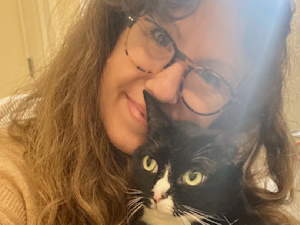
Elizabeth Laura Nelson
Elizabeth Laura Nelson is a writer and editor based in Brooklyn, New York, whose work has appeared in The New York Times, Jenny, Best Life, YourTango, Elite Daily, and more. She focuses her work on relationships, health and wellness, midlife, and lifestyle. As a child, Elizabeth was scared of cats (claws and teeth, yikes) but she has since gotten over her fear and now shares her home with three sweet and gentle feline companions who make life better (and cuddlier) every day.
Related articles
Why Do Cats Purr Loudly?
Turn down the volume, dude!
![Woman petting her Siamese cat on her lap.]()
The Power of Purr: Cats Can Help Heal Themselves With Their Own Purrs
They’re pretty great for people, too.
![Woman holding her cat.]()
Are You and Your Cat Astrologically Compatible?
They might not care about the answer, but you do.
Purr Like an Engine? 5 Common Reasons Why Cats Purr Loudly
Are they trying to tell you something with all that noise?
![dark-haired woman hugging cat that has imprinted on her]()
10 Signs Your Cat Has Imprinted on You
Feeling like you have a little shadow these days? Here’s why that’s happening.
